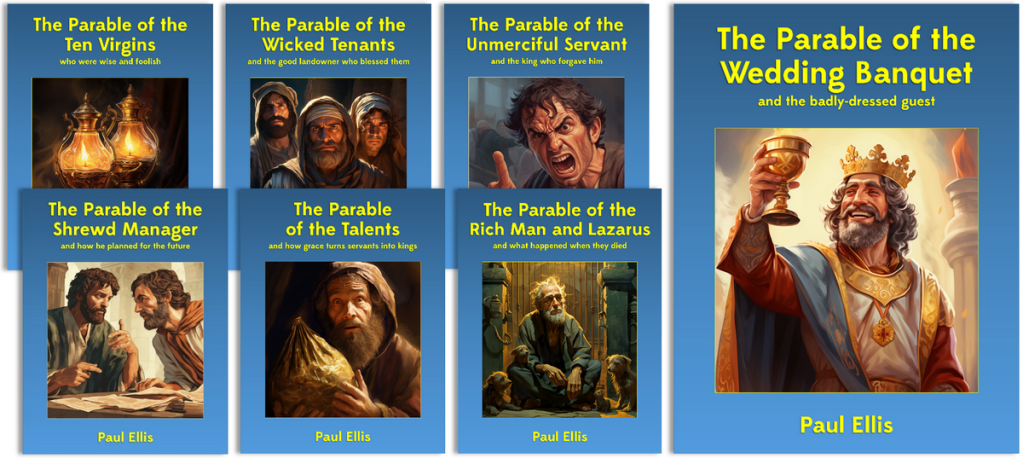
Every year on my birthday, my wife makes a delicious gumbo. It’s so yummy I usually have a second helping. And by second, I mean third or fourth. It’s that good!
But according to some theologians, I am sinning when I eat my wife’s gumbo. Why? Because gluttony, which is defined by some as “eating too eagerly” – is one of the seven deadly sins.
Don’t panic.
Gluttony will not send you to hell. An occasional gumbo feast might give you indigestion, but that’s about it.
Are you familiar with the so-called seven deadly sins – gluttony, envy, pride, etc.? You may have heard about the seven deadly sins in Sunday School or from catechism or from a certain Brad Pitt movie.
Some people worry about committing sins that are deadly, but did you know the list was originally invented by pagan philosophers and later adopted by Christian thinkers?
That should tell you something.
People sometimes ask me about the seriousness of their sins. They want to know if they have done one of the really bad ones or if they have got away with a minor sin.
In other words, “How much trouble am I in?” Or “Will God forgive me because what I did was really, really bad?”
Here’s what you need to know about sin: all your sins – past, present and future – were carried by the Lamb of God on the cross (John 1:29). Because he loves you, God is not counting your sins and trespasses against your (2 Cor. 5:19).
Which is really good news.
But does that mean there no deadly sins? Well, there is one deadly sin, which we can express seven different ways.
The Seven Deadly Sins
- UNBELIEF in the goodness and grace of God (Acts 13:43–46, Heb. 3:12–15, 10:29)
- UNBELIEF in God’s Son the Savior (John 3:16, 36, Heb. 10:29, 12:25, 1 Pet. 2:7, Jude 1:7)
- UNBELIEF in the truth of the gospel (Rom. 1:18, 2 Th. 2:12, Heb. 4:6)
- UNBELIEF in the finished work of God (Heb. 4:7–10)
- UNBELIEF in the gift of righteousness (Rom. 10:3)
- UNBELIEF in resurrection of the dead (Mark 16:14, John 20:27, Acts 26:8)
- UNBELIEF in the ministry of the Holy Spirit (Acts 16:6–9)
In the end, there is only one deadly sin, and that is the unforgivable sin of unbelief.
The sin of unbelief cannot be forgiven because he who commits it rejects the very thing that would otherwise save him. This rejection may take the form of hard heartedness (“I don’t need God”) or idolatry (“God needs my help”). In either case, the grace of God is rendered ineffective because it is not received.
Unbelief is a killer. There is no other sin like it. Yet we hardly talk about it. Manmade religion distracts you by drawing your attention to lesser sins (like gluttony).
Which is nuts.
(Speaking of nuts, I know a church where an elder was stood down for drinking wine at a family celebration. For a year, they made this man sit at the back near the door in a place of humiliation. They made an example of him because drinking alcohol is a sin. Yet most Sundays, they served communion – with real wine!)
There is far too much emphasis on sin in the church, but if we must talk about sin, let us discuss the dreadful consequences to unbelief.
To reject life is to choose death. To reject salvation is to remain lost. To turn your back, block your ears, and close your eyes to the goodness of God is to embrace darkness.
The subtle shades of unbelief
“Good stuff, Paul. I can think of several people who need to read this. But not me. I’m a believer. I’m saved and sanctified by the blood of Jesus.”
Wonderful. Be strong in the faith of the Lord. But are you attending to your unbelief?
Just as we can feed our faith, we can feed our unbelief, and that’s not something you want to do.
We tend to think of unbelievers as godless atheists, but unbelief comes in subtler shades.
In the church unbelief is manifested in the faithless language of debt and obligation. It’s asking God to do what he’s done. It’s bringing sacrifices and offerings he has not asked for.
An unbelieving believer ought to be a contradiction. Like dry water, there should be no such thing. If you are a born again believer, then believe all the good things God says about you – you are righteous and holy in Christ, completely forgiven and totally loved.
In the kingdom, all is grace. God provides, we receive. But we won’t receive if we think there’s a price to pay or a condition to meet.
This is why we need to be wary of messages that mix grace with dead works, or faith with unbelief.
Faith vs unbelief
The only thing that can render worthless the riches of God’s grace is unbelief. Unbelief prays, “God, please do this, and that, and the other thing,” but faith looks to the finished work of the cross and says, “Lord, you have done it all.”
Unbelief gives — “Lord, look at what I’ve done/built/brought for you” — but faith receives — “Look at what you have done for us.”
Unbelief toils and accomplishes nothing; faith understands that everything comes to us by grace for free.
Unbelief tries but faith trusts. Unbelief works, but faith rests.
The sole condition for receiving the delicious gumbo of God’s grace is you have to want it. The sinner must drop his guns and the saint must put down her offerings so that both may come with empty hands and faith-filled hearts to the table of his blessings.
—
If you are enjoying The Grace Bible series, the good news is it will be doubling in size in 2024. Learn more.
The parable of the Wedding Banquet may be the most misunderstood parable. It raises questions like: Why does the king slaughter the guests who refuse to come? And what is the city that is burned? Read this parable and you may think that God is temperamental, easily angered and that he torches those he doesn’t like. No, no, and a thousand times no. We need to read the parables of Jesus through the lens of new covenant lens. The next exciting installment in my Parables on Patreon series is available now.










